Good Parenting Advice for Conscious Parents on a Journey of Learning and Loving
If you're interested in good parenting advice from the perspective of viewing parenthood as a journey of self learning, mindfulness and reflection plus cultivating the skills of being unconditionally loving, conscious and empathetic, this parenting article is probably right up your alley.
In this parenting interview I have been so fortunate to have therapist and parent coach Megan Stonelake answer all my pressing parenting questions; parenting issues that I know parents struggle with all the time and would love in-depth answers to.
Drawing from personal experiences as a mother and therapist, Megan answers my questions with a wonderful blend of unpretentious honesty, compassion and high level of awareness. I hope you will enjoy reading her answers just as much as I did.
Below you'll find some of the common parenting themes Megan will provide insights into:
Challenging Parenting Themes That Megan Converts into Good Parenting Advice
- Why is it that parenting can be so difficult
and when do we typically experience this?
- How do we deal with our high expectations in
relation to our child?
- When times are tough in our parenting
lives, what is the most important thing to
remember?
- How do we remain open and loving without being
permissive?
- How do we deal with knowing that it is best to
be loving and conscious but not feeling it when
things are tough? What can we do?
- How do know whether to reinforce a house rule
or to let it go?
- What are the benefits of reversing the roles
and try to learn from our children - letting them
teach us?
- As parents where should our primary focus lie;
with ourselves and / or children or something else?
If you're curious about what Megan has to say about these parenting issues, please read on and enjoy your journey of discovery. You never know if she addresses just the piece of good parenting advice, you need to hear right now. :-)
But first, let's get to know Megan a little better:
About Megan Stonelake
 I
first noticed Megan Stonelake on Twitter and via her tweets, she struck me as very passionate in her parenting work and eager to share all her interesting insights and good parenting advice as they came to her in her work.
I
first noticed Megan Stonelake on Twitter and via her tweets, she struck me as very passionate in her parenting work and eager to share all her interesting insights and good parenting advice as they came to her in her work.
Also she appeared to me as being very aligned with the thought of letting love itself be a guide in parenting. Thus I was intrigued by her views and decided that I would love to hear what she would have to say about certain parenting themes that not only interest myself but also other parents.
But before we submerge ourselves into into the essence of this interview and all her good parenting advie, here is a brief summary of Megan, who she is and where to find her:
Megan Stonelake is a therapist, parent coach, parent blogger, and mama. Her fascinations include child development, teaching empathy, and all things parenting.
She is available to parents worldwide for parent coaching. On her blog, Empathic Parenting, you will find excellent parenting articles written in a critical, yet compassionate voice that contain a unique blend of honest personal parenting experiences and high level awareness.
You can also sign up for her newsletter to receive tips and musings
on peaceful parenting. You can also follow her on Twitter and Facebook.
The Parenting Interview
Megan's Parenting Background and Approach:
- A Desire for
Teaching and Spreading Empathy in a Culture Where It Seems a
Scarcity
 As
an introduction, could you tell us a bit about how your interest in
parenting came about?
As
an introduction, could you tell us a bit about how your interest in
parenting came about?
Was it a specific event or something else that made you realize that this was something you had to pursue further?
 My
interest in parenting has roots in my work as a child therapist. I
frequently found that while I could support a child in enduring a
difficult environment, often real change would need to come from a
parent.
My
interest in parenting has roots in my work as a child therapist. I
frequently found that while I could support a child in enduring a
difficult environment, often real change would need to come from a
parent.
My work supporting parents began in the fall of 2015 as a concern for a cultural lack of empathy in the U.S. I began telling my friends and loved ones, “someone needs to teach kids empathy!” Finally my mom gently pointed out, “Maybe that someone is you.”
I never had any interest in teaching children, but it dawned on me that the best way to raise a generation of empathic, resilient children is to support their parents.
My interest has grown from there, and working with parents has
become my greatest passion. As a parent, I relate to the struggles I
see in others daily, and I love supporting parents as they discover
the best version of themselves.
 Being
European, an anthropologist and interested in cultural parenting
styles, I find your point about 'a cultural lack of empathy in the
U.S.' very interesting.
Being
European, an anthropologist and interested in cultural parenting
styles, I find your point about 'a cultural lack of empathy in the
U.S.' very interesting.
In your opinion, is this something new and in what way is that a reflection of modern American cultural values? Why do you think there is a lack empathy?
 I’m
not sure how the rest of the world views the US right now, but from
my perspective our lack of empathy is easy to see in the results of
our recent election.
I’m
not sure how the rest of the world views the US right now, but from
my perspective our lack of empathy is easy to see in the results of
our recent election.
Our president elect is openly xenophobic, racist, sexist, and he has promoted violence on numerous occasions. That a person such as him could even be elected indicates to me there’s a serious, systemic problem in America.
No one could brush off his boasting remarks about sexual assault if they thought he might harm their mother or daughter.
No one could endorse his views
on immigration if they personally loved an immigrant. We’ve become
very adept at de-humanizing the “other” and I think that will have
catastrophic results in the US.
However, I don’t know what
this is a particularly new part of my culture. There seems to be a
pervasive idea that freedom and rugged individualism are synonymous.
But we know from research on the brain that humans are inextricably
linked. We need relationship so desperately that babies will
literally die without it. We are interconnected and interdependent,
and that’s not a fact the US has ever truly embraced.
 If
you were to characterize your parenting approach, how would you
describe it? What is important to you, what do you focus on?
If
you were to characterize your parenting approach, how would you
describe it? What is important to you, what do you focus on?
Also are there areas or approaches that interest you less or don't speak to you and why is that?
 I
strive for empathy. This means choosing my responses to my four year
old son with his developmental phase and specific needs in mind. I
try hard to have age appropriate expectations of him and look for
what he is trying to communicate to me.
I
strive for empathy. This means choosing my responses to my four year
old son with his developmental phase and specific needs in mind. I
try hard to have age appropriate expectations of him and look for
what he is trying to communicate to me.
My hope is that I can help
him to continue to grow into the person he was born to be without agenda
or expectation.
Approaches that don’t interest me are ones
in which a parent has determined who their child will be and how
they will mold that child accordingly.
I don’t worry about my son
being the smartest or the most athletic. I just want him to feel
unconditionally loved and accepted.
Good Parenting Advice for Parenting on the Edge
What to Do When Times Are Tough and You're Worn Thin
 One
of the most frequently asked parenting questions of all times, I
guess, is why is it that parenting can be so difficult? And when do
we typically experience this? (To what extent does it have something
to do with us, as parents, and/or when does it have something to do
with our kids?) Or how do you view this issue - do you have any good
parenting advice on this?
One
of the most frequently asked parenting questions of all times, I
guess, is why is it that parenting can be so difficult? And when do
we typically experience this? (To what extent does it have something
to do with us, as parents, and/or when does it have something to do
with our kids?) Or how do you view this issue - do you have any good
parenting advice on this?
 Parenting
can be SO difficult. There’s no denying it.
Parenting
can be SO difficult. There’s no denying it.
I think it feels particularly challenging when our lives lack balance – either we aren’t sufficiently meeting our own needs, or we’re overscheduled, or we don’t have the awareness to accurately read our children and ourselves.
When we lack awareness, we always run the risk of projecting our own issues onto our children. We all do this. I’m pretty sure I did this to my four year old just yesterday.
But when I’m aware and attuned, I notice this tendency, and I can choose a different way. When I stop fighting against who my son is because I need for him to be something or someone else, I’m able to swim with the current rather than against it.
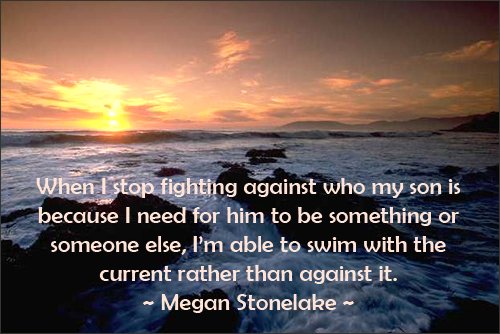
 In
my experience some of the most typical parenting challenges occur
when our child does not live up our expectations.
In
my experience some of the most typical parenting challenges occur
when our child does not live up our expectations.
Whether we want to admit it or not, we often have a thousand ideas about how we want our child to be and behave. And when our child doesn't meet OUR ideas or beliefs about how they should act, we experience pain.
Reality is letting us down as it is not in alignment with our thoughts. Do you have any good parenting advice as to what to do in such circumstances?
Any good parenting advice and practical steps that could help with dissecting (if that is what it takes) and dealing with such everyday challenges?

When we are mindful, we can shift the focus from what our ego wants to what our child needs.
If they’re behaving in a way that is contrary to our values as a family (for example cheating, acting in a manner that’s unkind or destructive), we need to meet that behavior with firm boundaries and unconditional acceptance.
If however, our child quits an activity we admire or doesn’t do as well in school as we would have hoped, it’s helpful to examine to what extent our ego is driving how we respond to our child.
It’s not our children’s jobs to fulfill our unmet goals or live out our fantasies. They don’t owe us anything in this regard, and insisting upon this will lead to pain and disconnection.
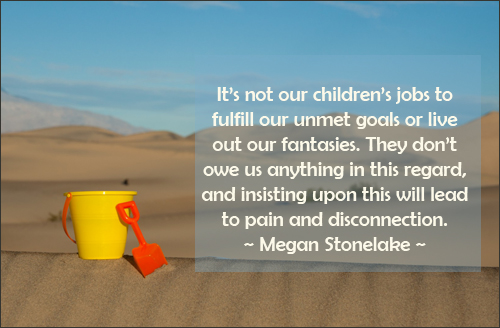
 When
times are tough in our parenting lives, what is the most important
thing to remember and how may this help us through it?
When
times are tough in our parenting lives, what is the most important
thing to remember and how may this help us through it?
 I
always remember a quote from writer and speaker Rob Bell,
“If you
have a kid who is making you miserable, that kid is miserable.”
I
always remember a quote from writer and speaker Rob Bell,
“If you
have a kid who is making you miserable, that kid is miserable.”
From
this place, we can remember that we’re on the same team. Our
children don’t struggle to spite us, they struggle because they’re
learning to navigate a brand new world and need our help.
Also, everything is a phase. My husband and I say this to
each other whenever things feel really hard. This is a brief moment
in our lives, and things change so quickly with children. Nothing
lasts forever, and all we can do is stick together and focus on the
bright spots that are always there, even if we can’t see them.
Being Your Own Critical Parenting Rules Investigator
Learning How and When to Enforce Rules or When to Simply Throw Them out the Window!
 It
is my experience that many parents today are interested in parenting
with unconditional love and deep empathy. They really want to
connect with their child and want to be sure that their child feels
loved.
It
is my experience that many parents today are interested in parenting
with unconditional love and deep empathy. They really want to
connect with their child and want to be sure that their child feels
loved.
However, they also struggle with trying to understand how to be open and loving without being permissive. How do you view unconditional love versus permissiveness? Is there a way for parents to identify which is which so they can be unconditionally loving without compromising their integrity?

He then explained that she often becomes very upset about this rule, and he asked if he should still give her the apple when she’s had a meltdown about the rule.
The permissive parent would throw the rule out the window and give her the apple the way she wants it, the authoritarian parent would insist she no longer deserves the apple. The empathic parent would maintain the rule and allow his daughter to have her feelings about the situation.
I think that’s the important distinction: parenting with love and empathy doesn’t mean we don’t have rules. It just means our rules aren’t arbitrary or oppressive. We choose our rules intentionally, and then we recognize that our children have every right to experience their own opinions and feelings about those rules.
 When
you choose a rule or choose to stick by a rule what kind of thoughts
do you have or questions do you ask yourself in order find out
whether the rule has its merits; whether it actually makes sense or
whether it is just kept because of tradition or fear of losing your
own authority as a parent?
When
you choose a rule or choose to stick by a rule what kind of thoughts
do you have or questions do you ask yourself in order find out
whether the rule has its merits; whether it actually makes sense or
whether it is just kept because of tradition or fear of losing your
own authority as a parent?
When is throwing a 'throwing a rule out the window' permissive and when is it not?
 If
I can’t explain a rule to my son, odds are it isn’t serving a
purpose. We have firm rules around safety, kindness, and respecting
each other’s bodies.
If
I can’t explain a rule to my son, odds are it isn’t serving a
purpose. We have firm rules around safety, kindness, and respecting
each other’s bodies.
A rule is worth throwing out the window if we can’t muster up a
decent justification for it or if our children have outgrown the
need for it (for example, no one makes their twelve year old hold
hands to cross the street).
Turning Your Meltdowns into Valuable Learning Experiences for Everybody
When the 'Ideal Parent' Doesn't Survive Meeting Reality
 Having
theories and ideas about how to be the ideal parent and practicing
it may be two different matters.
Having
theories and ideas about how to be the ideal parent and practicing
it may be two different matters.
For instance, let's imagine that you're stressed out and exhausted and your child is throwing a fit or doing something you don't approve of which makes you feel irritated, frustrated and maybe even angry.
We may have the awareness that being loving and conscious is most conducive in the situation, however we don't feel it right now.
What can we do in situations like this?
 Well
I’ve never experienced this scenario, so I have no idea. JUST
KIDDING! This is me at some point almost every single day.
Well
I’ve never experienced this scenario, so I have no idea. JUST
KIDDING! This is me at some point almost every single day.
On good days in those moments I check in with myself about what I need: Am I hungry? Do I need a moment of quiet to collect myself?
Usually a find a lack of balance somewhere inside myself, and I give
myself permission to meet my own needs so I can then care for my
child. There are no awards for martyrdom, and I don’t feel guilty
for taking care of myself. It’s the only way I feel equipped to care
for others.
On a bad day, however, I completely lack
awareness and simply react, often from a place of exhaustion and
feeling overwhelmed. I snap, and only after I see my son’s hurt face
do I realize I could have avoided so much difficulty by having more
awareness.
It’s always a learning process, and I do my best without beating myself up. When I don’t react well, then I get to model for my son what it looks like to admit mistakes and repair a relationship. That certainly has its own value.
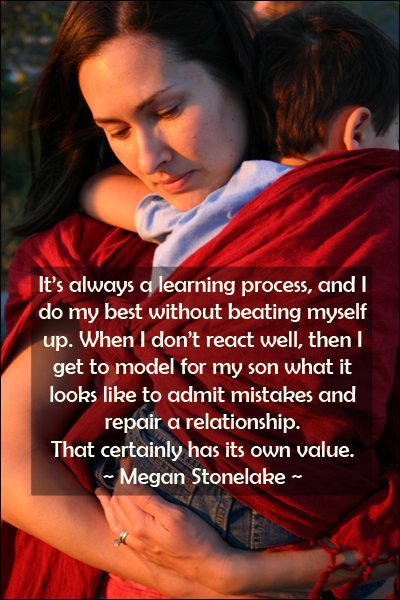
 I
love that! That is such good parenting advice and must be a relief for many
parents; that our own periodical lack of awareness actually has
benefits for all if everything is viewed as learning process.
I
love that! That is such good parenting advice and must be a relief for many
parents; that our own periodical lack of awareness actually has
benefits for all if everything is viewed as learning process.
In order to practice this mindset of 'reaping the gifts of all situations also the painful ones', is there something; an easy-to-remember phrase said to yourself after the incident, you yourself use or you can come up with that can help parents raise their awareness and adjust their mindset to learning and connecting again? After our meltdown what can we say to ourselves to be reminded?

For parents whose child isn’t quite so verbal, I would suggest keeping connection in mind. Re-establishing connection always helps, both us and our kids.
Even when I’m still angry, I’ll offer my son a hug, and he always
gratefully melts into my arms. With that physical connection, we’re
both reminded that the relationship between us trumps any argument
or frustration we may experience.
Taking a Step Back into Peaceful Parenting Roles
Being a Gentle Gardener Nurturing Budding Seedlings
 Many
parents think of themselves as being in a specific role towards
their child. They take on a certain identity more or less
intentionally.
Many
parents think of themselves as being in a specific role towards
their child. They take on a certain identity more or less
intentionally.
Do you operate with roles? If yes, what do they 'give' you? If no, why not? How do you view a 'parent' and how do you view a 'child'?
 Often
as parents we think it's our job to shape our children into good
people.
Often
as parents we think it's our job to shape our children into good
people.
I love Alison Gopnik’s analogy of the carpenter and the gardener:
- When we parent as carpenters, our work is meticulous, and we’re
working towards a specific end product. This isn’t a good model for
parenting, and it can lead to frustration for us and our kids when
we’re constantly trying to make them who we want them to be
(successful, smart, outgoing, etc.).
- When we can let go of that expectation of ourselves and our kids, we
can allow joy to flow. Viewing ourselves as gardeners means
that we lovingly care for budding seedlings, recognizing that we
will have to protect them from the elements and pests until they’re
well established.
We don’t have a set prescription for how many blossoms each flower will produce or how large they will grow. We cultivate them with the knowledge that they will be what they will be, and we’ll enjoy and delight in them.
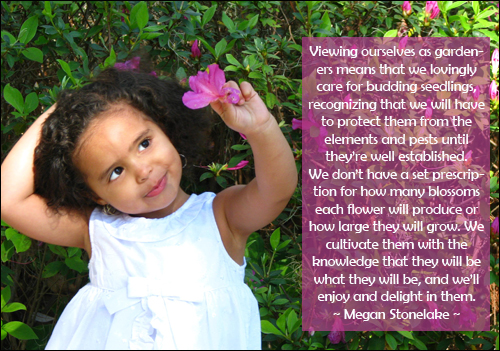
The Gift of Humbleness: Putting Your 'Teacher Hat' on the Shelf and Let Your Child Teach YOU
 Some
of the greatest insights I have had, have come to me when I was
being humble towards my child.
Some
of the greatest insights I have had, have come to me when I was
being humble towards my child.
By humble I mean in the sense of not taking on 'the teacher hat' but being very open and receptive and reversing the traditional child = student, parent = teacher, roles in my mind.
In this way I can choose to look at my son as my teacher. Have you tried anything like that? If so, what did you experience and what kinds of benefits may we reap when stepping back from the 'all-knowing' position?

I admire this so much about him, and it also can make me incredibly uncomfortable. When he doesn’t want to do something, he will say no. If people bother him (child or adult), he will tell them.
I watch this happen and sometimes the people pleaser in me can barely stand it. But when I can be humble, as you’ve mentioned, I can learn so much from him about boundaries and direct communication.
He doesn’t have any hang ups yet, so he’s just forthright. He feels entirely within his rights to share his opinions, as well he should!
I have so much to learn from him about not accommodating others at
the expense of myself, and it’s very important to me that I not
suppress this aspect of his personality or somehow express that it
is anything less than admirable.
Balancing Self Care and Emotional Availability
Teaching Children Self Worth and Self Care by Modeling it Ourselves
 Some
more 'spiritually' inclined teachers or speakers say that the most
important person in your life is yourself; that we are the ones that
we live with everyday, so no one can be more important. Thus we need
to tend to ourselves first, otherwise we cannot be there fully and
completely for anybody else, not even our kids.
Some
more 'spiritually' inclined teachers or speakers say that the most
important person in your life is yourself; that we are the ones that
we live with everyday, so no one can be more important. Thus we need
to tend to ourselves first, otherwise we cannot be there fully and
completely for anybody else, not even our kids.
For some parents such a stand may seem very provocative as they believe it is a selfish way to view things. How do you view these viewpoints and why? What is your own take on this and how does it work best for you?
 I
think boundaries and balance are essential. I think we all
want to teach our children to ask for what they need and that they
are worthy of care and attention. We aren’t modeling this when we
fail to take care of ourselves because we believe it’s selfish.
I
think boundaries and balance are essential. I think we all
want to teach our children to ask for what they need and that they
are worthy of care and attention. We aren’t modeling this when we
fail to take care of ourselves because we believe it’s selfish.
If we aren’t using punishments and rewards to control our children’s behaviors, that means we are parenting from a place of connection. In order for our connection with our children to be strong, we need to be present and attuned.
I’m not capable of parenting in that manner unless I’m eating well, getting enough sleep, and managing my stress level. I can’t be the parent I want to be if I’m not taking care of myself.
However, because I emphasize connection, I recognize that I will need to be emotionally available for my son. Sometimes I do have to make sacrifices to meet his needs. Often that’s just the nature of parenting. It’s a constant negotiation between what we need and what our kids need.
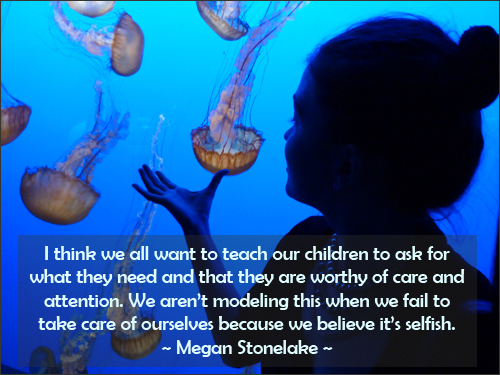
Megan Boils It all Down to the Essence
At the end of this interview Megan give us three sharp
pieces of good parenting advice that we can take with
us in our own parenting life:
1) Keep an Open Mind: As Conscious Parents Our Work Is Never Done
 What
is the most important thing, you've learned about yourself and your
children since becoming a parent?
What
is the most important thing, you've learned about yourself and your
children since becoming a parent?
 I’ve
learned so much from my son. Most importantly, I think, I’ve learned
that one of the biggest gifts I can give my son is to keep working
on myself. Keep working to be more kind, patient, and aware.
I’ve
learned so much from my son. Most importantly, I think, I’ve learned
that one of the biggest gifts I can give my son is to keep working
on myself. Keep working to be more kind, patient, and aware.
I’ve learned that my work is never done, and I will always be working through my own baggage to be the peaceful leader I want to be.
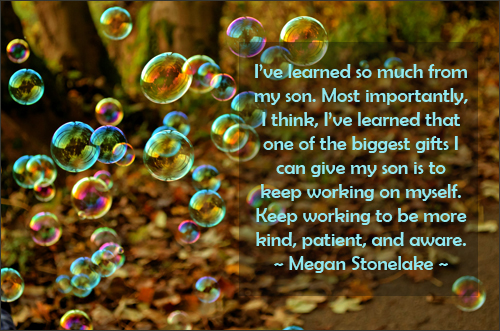
2) Stay Humble and Don't Fear Admitting Your Mistakes
 Is
it possible to transform that insight into some good parenting advice?
What would it be?
Is
it possible to transform that insight into some good parenting advice?
What would it be?
 I
think the advice would be this: don’t be afraid to admit your
mistakes in parenting. We can all get defensive, but that doesn’t
lead to growth, connection, or understanding.
I
think the advice would be this: don’t be afraid to admit your
mistakes in parenting. We can all get defensive, but that doesn’t
lead to growth, connection, or understanding.
I think effective parenting is more likely to come from a place of
humility and vulnerability than it is a place of hubris and
obstinance.
3) We're all Doing Our Best ... but When We Know Better, We Do Better
 If
you had a parenting 'motto' or quote to live by, what would it be?
If
you had a parenting 'motto' or quote to live by, what would it be?
 We’re
all doing the best we can with the skills and knowledge available to
us - that goes for us and our children. When we know better, we do
better.
We’re
all doing the best we can with the skills and knowledge available to
us - that goes for us and our children. When we know better, we do
better.
This marks the end of this parenting interview and Megan's good parenting advice for self-reflective parents on a journey of making parenting more peaceful and joyful for both parents and children.
I hope you enjoyed it and found some good parenting advice in it that made you richer in whichever way you want to grow.
Your Positive Parenting Ally,
Birgitte

Want to stay in touch and get the latest news?
Sign up
for my free newsletter
Parent Coaching
- For Inner Peace, Clarity and a Deeper Connection to Your Child
 Being a parent can feel like a double-edged sword. Life with kids may feel like the greatest gift you have ever received, while at the same being hugely challenging, often leaving you confused, stressed and overwhelmed.
Being a parent can feel like a double-edged sword. Life with kids may feel like the greatest gift you have ever received, while at the same being hugely challenging, often leaving you confused, stressed and overwhelmed.
When we feel like this, we've lost touch with ourselves. We can't hear our own inner voice, and it's difficult to know what is 'right' for us and how to act.
I offer in-depth parent coaching to help you regain your balance and get back in touch with yourself. From a place of inner peace and clarity, your will find your own answers which will help you reconnect with your child from a place of unconditional love and acceptance.
Read more about my parent coaching here.
Where Would You Like to Go Next?
Other Parenting Interviews That Might Interest You:
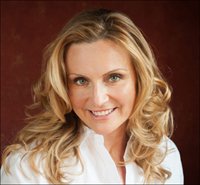 Denmark's Little Secret of Better Parenting Can Be an Eye-Opener ... and a Mindset Revolution if You Dare Look Inside Yourself, too. A parenting interview with Jessica Joelle Alexander. |
 Uncommon Answers to Common Parenting Questions: An In-Depth Interview on How to Consciously Parent in Peace and Love. A parenting interview of Positive Parenting Ally by Abdullah Atturki. |
 Good Parenting Tips for Growth Orientated Parents Who Are Bold Enough to Look Inside. A parenting interview with parent guide Natasha Solovieff. |
 The Simplest, Yet Most Powerful Parenting Tools: Conscious Loving and Teaching Kindness. A parenting interview with kindness catalyst Kylie Riordan. |
 Empowering Tips on Parenting with Spiritual Awareness An In-Depth Interview with spiritually aware parent coach Christina Fletcher. |
|
Back to the top of this page about Good Parenting Advice for Conscious Parents on a Journey of Learning and Loving
Go to the Positive Parenting Ally Homepage







